Recollections of a racial past in a racist present
NB: I have used racially derogatory terms throughout this piece in an uncensored fashion in order to paint a picture of racism for those who have never felt its tongue and temper, and to better critique and convey their vitriol.
Foreword
I need you to understand two things when you read this note. First, this is probably going to hurt you. Not as much as it hurt me and the uncounted others who continue to experience a similar existence under the yoke of routine and random racist oppression, but nonetheless those of you willing to listen and hear and disassemble your fear will face multiple emotional cuts and bruises. You built an Empire based on domination of black by white. What you are facing now is the whiplash of time. But believe me, we of colour faced the ‘lash in many different forms.
Racism isn’t a thing of the past. The past resides in the present. Racism is normal, routine, alive, constant, present, always ugly whether subtle or brutal. It was encouraging today to read the statement from Universities UK acknowledging the omnipresence of racial harassment. It was painful that only racial harassment was acknowledged, as if somehow there was only harassment, rather than repudiation, hatred, loathing, disgust, denial, discrimination, punching, kicking, enslaving, exclusion and so many other shades of violence. Black people say it still affects them daily, white people and institutions deny it, as they did the first times around. The past is alive in the present.
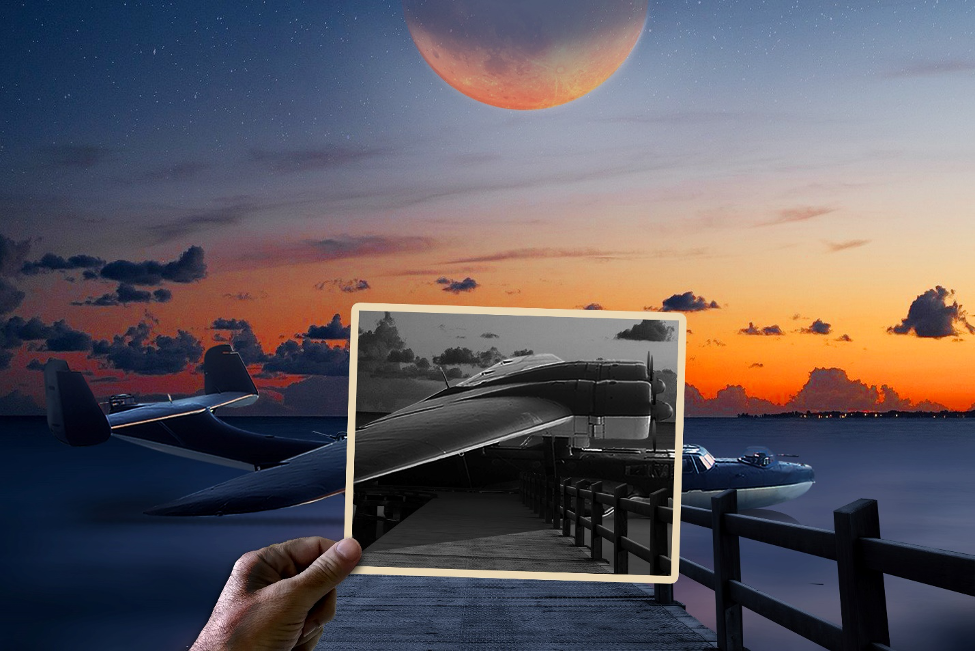
Copyright Dr. David Roberts 2020
The second thing you must recognize, acknowledge and understand is that racism is structural. There is no such thing as a ‘one-off’ or ‘isolated’ racial ‘incident’ like harassment. Individual racist acts of all kinds come from wider beliefs fed by Fascist, racist ideologies that prevail without necessarily always appearing to do so. They fester in beliefs about white superiority inherited from imperial domination handed down through myths of benign intervention, creating institutions of discrimination underpinned by social and educational curricula of exclusion and denial. If you cannot hear this, if it is not acknowledged, nothing will change – for why would you seek to change something you did not think was broken? Paulo Freire said the only people who can change the actions of the oppressors are the oppressed, because the oppressors do not realize their role in oppressing. I know/hope that isn’t true, but so far, despite oppressed people telling their oppressors what is happening, there has been too little meaningful change where I am.
This is my story. You may not view it as porn for titillation, only to dismiss my experiences as one-offs. They were not. They were organized through the underlying learned and propagandized racist beliefs on the part of white imperial Britons about people of colour. You may instead open your minds to understand that heinous as it is, racism is alive and kicking in the UK now, and must inevitably be so at this institution, like many others, because too little has been done to end it. Three scholar-activists recently wrote this telling line and it should be heard clearly amongst this particular academic community and its broader compatriots: ‘Engaging with its past requires white academia to recognize how the university continues to serve as an arm of the state, perpetuating and hardening borders that facilitate access, circulation and value of white knowledge at the expense of non-white people and our knowledge’. Racism doesn’t go away on its own, not individual not group, not institutionalized and internalized ideology without active intervention. It doesn’t even go away when civil wars are declared. It only goes away when ideas and beliefs are not just challenged but publicly reviled, repudiated and rejected, and not just in rhetoric but in living, active, honest institutional acknowledgement followed by reform at all levels, in all places.
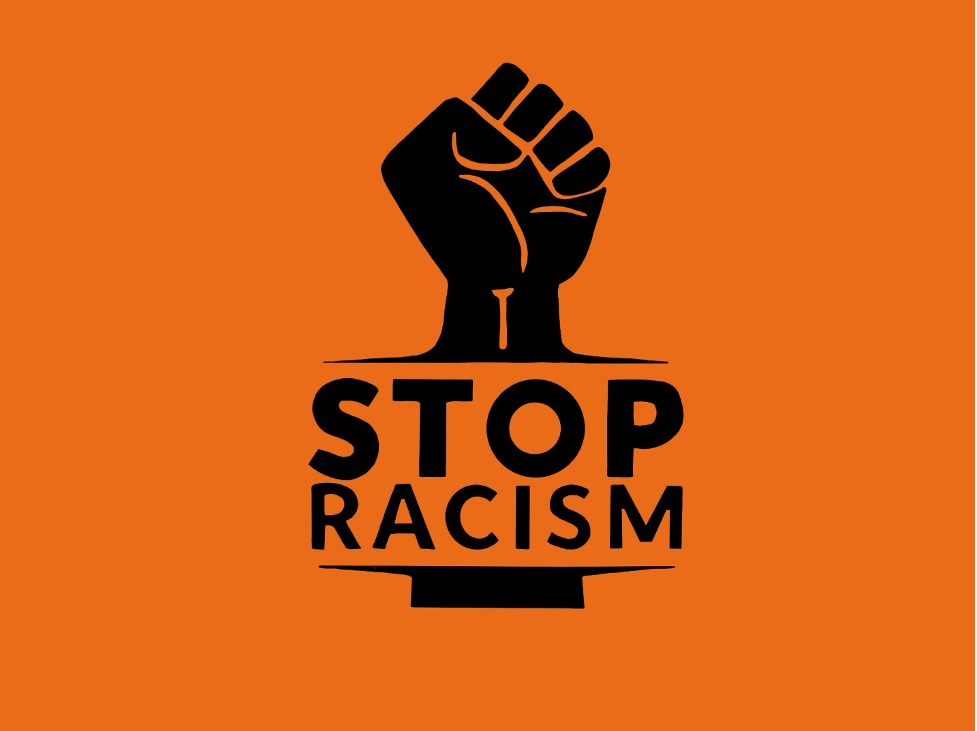
Denial ain’ jus’ a river in Egypt
I was razed (think about it) in the North of England in the 1960’s. I’d never known another place and had a white mother and a white father and believed I was white in a bright, white world. But my parents had lied to me about who I was. I was part-adopted, the truth of who I was, and am, buried in the shame of the poor, young, white-trash girl knocked up by a foreigner she met once or twice, and whom I met never. That truth was further masked by the fat white drunk who saved her fallen ‘honour’ by marrying the woman with the dark-skinned bastard child. That was me. That was how the world represented me to myself.
The ‘tolerance’ for which my social, cultural, legal and political homeland is famously known was nowhere to be seen. Mostly back then, instead of tolerance, it was the rhetoric and racist distaste of a nation whose own identity had run aground on the shores of post-War hypocrisy. After all, the country that claimed to fight for freedom from Nazi oppression could hardly perpetuate such dominion over its imperial minions. Global times were changing; local attitudes were not. British society could still Lord it over the Niggers at home, if they couldn’t do it abroad as much anymore. They could still reinforce their own diminishing self-respect for their sceptered isle as their place under a foreign sun receded before their Empire-moistened eyes.
I was a very happy kid, for a while, before school, before the institutions of nations and the white determination of who I was and who I could be meant I would not be. In school, in 1960’s and 1970’s England, I discovered that I wasn’t white: my parents’ lies had created an optical illusion. I was described variously as ‘olive-skinned’ (my aunt); ‘dark’ (neighbours), and a ’filthy fucking Paki’ (one of my teachers, and thereafter, most of the kids at school). It was shortened to a slightly more civil ‘Paki’ or ‘Paki bastard’ most of the time. Along with these epithets came the usual suspects and targets of white English derision: ‘nigger’, ‘Yid’; ‘Jew-boy’; and the eminently kinder ‘wog’ and ‘blackie’. There were other terms of white endearment but these are the ones that stuck, and which percolate still in my mind, because that kind of violence never disappears completely. Whoever said ‘sticks and stones may break my bones but names will never hurt me’ wasn’t routinely, daily denigrated for his ethnic identity by young and old alike, year after year. I had no idea I wasn’t the only one that suffered at white hands because I was the only non-white and the Internet hadn’t been invented. Awareness of direct and indirect forms of violence came later.
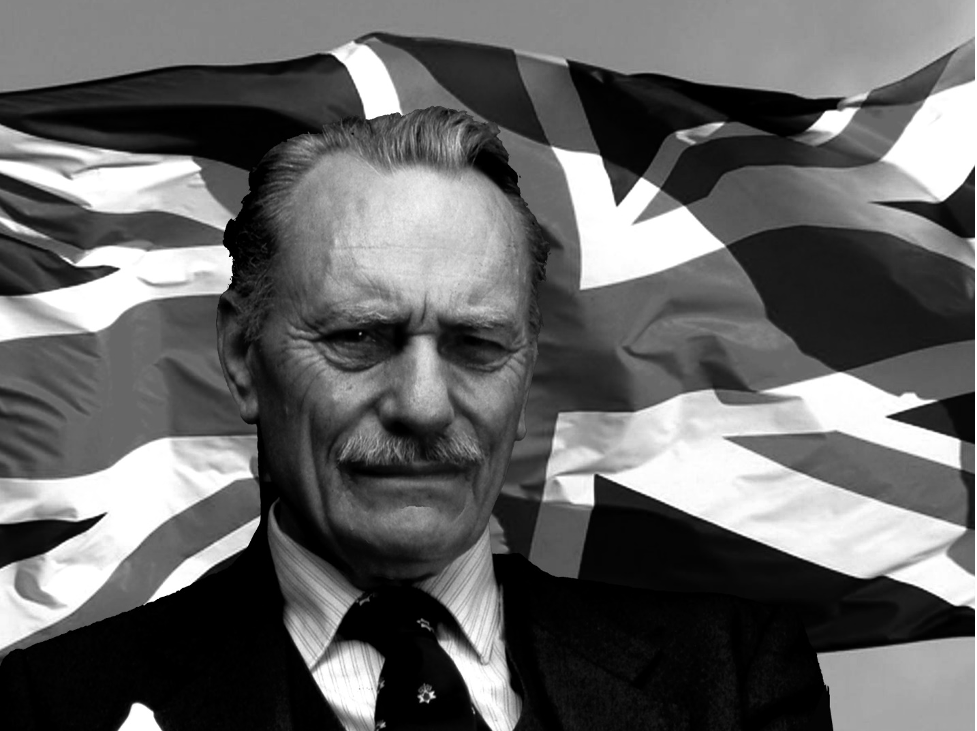
Copyright Wiki Commons CC3.0/Allan Warren
Racism was my norm, and it was structural. Racism as it applied to me was never a ‘one-off’, the product of an aberrant individual or group. Like sexism, racism in my childhood, and now, is the product of values and beliefs that rest on the notion of white supremacy and black inferiority. Racist events were, and are, never just events. They are processes and they were, and are, normal. When the British state refuses to consider how big fat statues valorizing and honouring imperial warlords might endorse racial loathing, they reinforce and represent older values about the correctness of white racial domination. One act of racism is never just that. It is the outcome of decades and centuries of state-sanctioned oppression in foreign lands ‘of which we know little’, then transported and represented to the white homeland. Racism is structural, meaning inequality not caused by individual ‘failings’ and ‘weaknesses’ but by organized sets of rules coming from institutions like the government, the legislature, the business sector, the banks. It’s the inequality ramped up by the laws that say the truth of England’s history cannot be repeated in school, lest it upset white people. That’s structural inequality: laws embedded as norms that mirror and reproduce values. Those values are formalized, authorized, instituted and communicated through the Foucauldian networks of state power than dictate how social life should be directed and disciplined. Racism never resided solely in metropolitan halls of power, or it would never have reached me and the millions of others who have experienced it. The hundreds of millions of individual acts of racism are funneled from state to people through nodes of governance that direct violence and control against the lesser peoples. They are the council officers who discriminate in housing allocation and applications. They are the police stations that turn away black complaints against white people. They are the hospitals that prioritize beds for white folk, the state-licensed pubs that refuse to serve ‘blacks, Irish and dogs’, the prisons with a disproportionate black population, the bus depots that segregate black from white. These individual racial energies come from ideological belief directed by institutions against individuals: young brown kids in schools, in this instance.
Racial resistance was illegitimate and even nonsensical in my world, in England, because England ‘tolerated’ colour so how could there be a problem? I only later realized that tolerance amounts to a kinder and gentler racism that sanctioned our presence only on condition of prescribed behaviours that didn’t offend Whitey. I was so proud when I came to the realization on my own that I didn’t want to be tolerated. I came to understand that I wanted and deserved to be accepted and respected, and there were no grounds on Earth on which another human being who differed in the colour of his skin should not be. I knew this because I knew I had done nothing wrong other than offend cowardly bigots who could only ever attack me with the permission and authority of social and state sanction. That consciousness came much later, and with no thanks to my academic schooling. Quite the reverse. It was pounded into me, literally, that racial oppression was officially sanctioned.
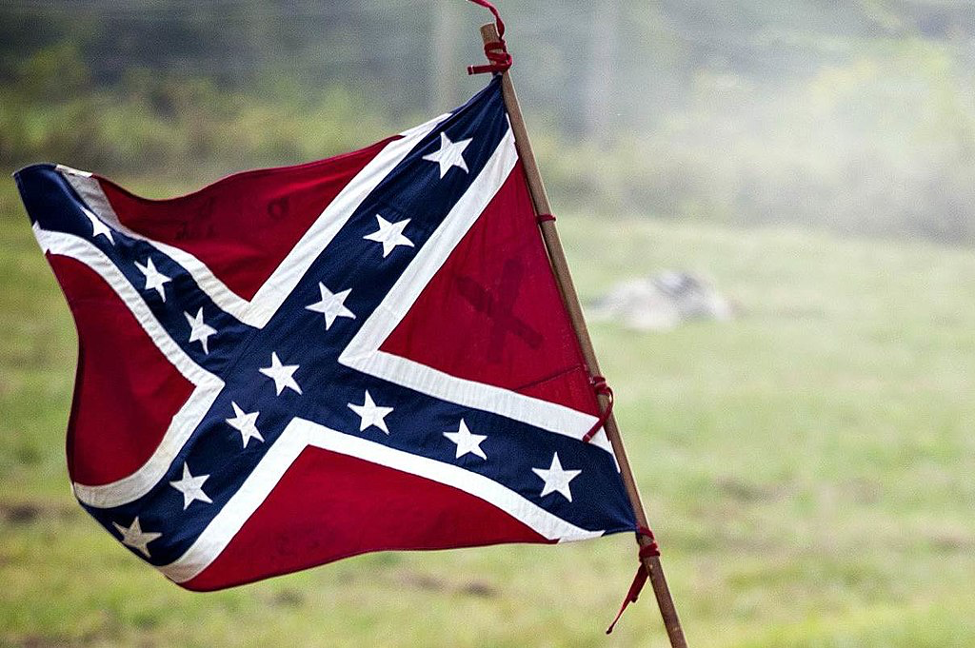
Copyright Wiki Commons Public Domain
Amidst that space of oppression were a few boys who didn’t persecute me. They saw the funny, happy kid who loved planes, dinosaurs, his bicycle and reading comics. They were my friends, and because of that they were also demonized by other white boys: epithets like ‘paki lover’ and ‘nigger nancy’ were further sanctioned by teachers though their lack of interest in challenging this racism, and by some who were overtly racist themselves. The historian who thought Empire was essential, I recall, to control the ‘breeding of blacks’ and keep them in their place, under imperial heel. But there was one teacher who saw what was happening. In my despair, I had announced I was joining the Fascist British National Party, a racist band of ignorami and simpletons steeped in hatred but increasingly popular as ‘waves’ of foreigners arrived in England from decolonizing shores. All the teachers knew; I was a laughingstock because the BNP would not welcome someone my colour into their ranks. Of all those teachers who could have intervened to help a confused, brutalized, hurting little lad, the one who did was ‘Raz’ Berry. He was tiny and bespectacled and taught German. Unlike the other teachers, he’d fought Naziism (it was only 30 years after the Second World War), and he’d penetrated the Nazi military regime as a Royal Marine Commando explosives saboteur. He was the kind of man they make movies about, except he didn’t look tough or masculine or otherwise soldierly. He looked ordinary, bespectacled. When he took me aside to talk gently and kindly to me about my ‘choice’, he didn’t talk about the war. He talked about how if I joined the BNP, I would be told to harm black people the way I was being hurt. He understood I was desperate to escape the hateful verbal abuse, the beatings and the hospitalizations, the boys who spat on me all the way home, the teachers who perpetuated it. He located my empathy and my interior courage. And my sanity; in many ways, my short-lived move towards the BNP was a function of my mind’s descent into a bizarre realm where I would join white oppressors as a child of colour and hurt my brothers and sisters. Racial violence takes many shapes.
In all of this, my identity had become socially edited. In nation-states, we experience identity in legal form, represented in our passports. That identity gives us sanction and legitimacy as citizens. I had a British passport, but that permission to exist as a member of a white tribe in a triangular island was denied by most others I came into contact with. No-one believed I was British because of my appearance, and because of the then relative rarity of darkness in the north of England in the 1960’s and 1970’s. I wasn’t allowed to be British by society at large. The Monarch was their Queen, not mine, they told me. I should go back to where I came from (London, as it happened), a refrain echoed fully half a century later by the most powerful idiot in the world, of four of his own American Senate members.
Institutional racism
That social editing took its toll. I was unsure of who I was and could be. The State seemed to say one thing, even welcoming my later application to become a Royal Air Force pilot. The citizens I would then defend as an RAF officer, objected. Perhaps the RAF remembered that its greatest battle was won in the summer of 1940 with foreigners, from Eastern Europe, the Caribbean and elsewhere around the Empire and beyond, fighting Aryan Supremacy. But I was left with a yearning to belong, and nowhere to belong to. Whites wouldn’t have me and I had no idea of where my heritage lay. Except that it lay, of course, in England. Right here. I just didn’t have white permission, and to challenge it meant to be beaten. Until I joined the Air Cadets, a youth body that funneled recruitment into the RAF and gave kids like me opportunities they could barely imagine. Across the whole country, British (almost exclusively male) youth was released each weekend from ‘the surly bonds of Earth’ in small, old training aircraft flown by the men that beat the Nazis. The pilots we flew with had fought against catastrophic odds in the Battle of Britain, or led daring raids at night into enemy territory in the imperial world war that pummeled the world and its people for six devastating years. They never bragged. They never recounted. They never spoke of it unless we badgered them for information, like inspired kids do. They were ordinary men like my German schoolteacher who had not wanted to fight or kill but were forced to by circumstances, and they had defied desperate odds that would otherwise have seen the world even more racist than it is now. They were all lily-white, and in the five years I was there, at Woodvale, I recall not one racist remark coming my way. I was treated the same as the other (white) cadet organizers. The RAF pilots taught me to fly, and far more: Immelmann Turns, barrel rolls, spin recovery, dead-stick landings, run-in and breaks, stall turns and at no point in my life had I ever felt, and been, safer. I flew with gods and there was no racism. No-one would attack me. Racism began to seem so arbitrary: safe in one place, persecuted six miles away. It was my racial oasis and my second, countervailing, influence. Racism wasn’t compulsory.
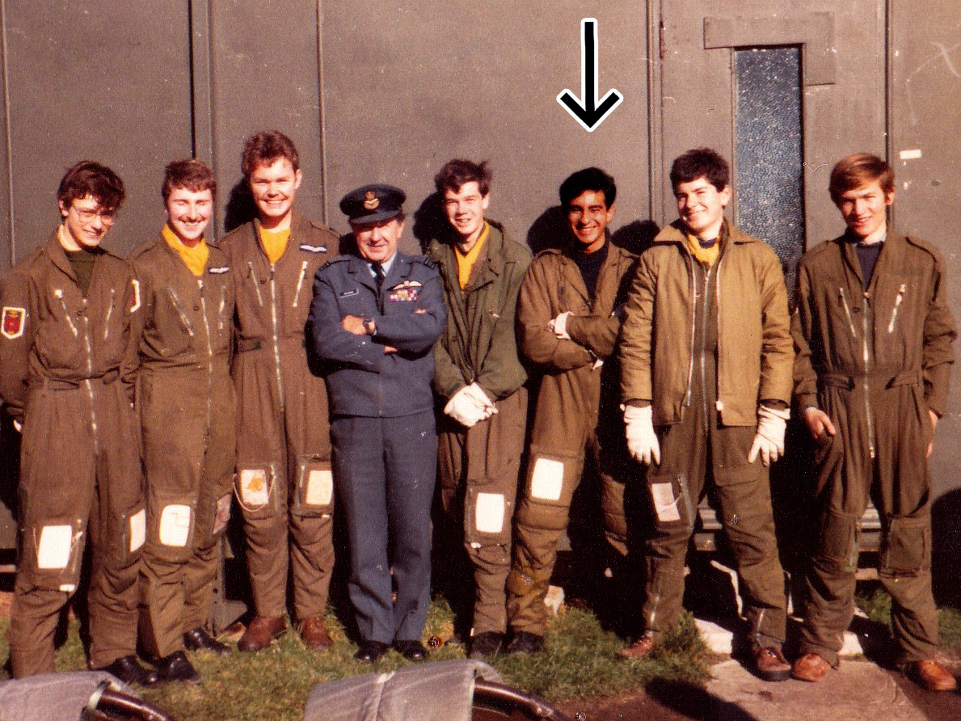
Copyright Dr. David Roberts 2020
I was part of something much bigger that didn’t hate me. I belonged. I was accepted. I was learning things I wanted to learn, enjoying experiences I could never otherwise have had, earning social spurs like (youth) military rank. I went on outdoor activities with the Air Cadets around the country, and met more boys like me, with whom racism was never discussed because we didn’t know it as racism. We knew it as life. We were so ignorant. We had no idea of the American Civil Rights Movement with its range of resistances and challenges to racism, from the peace of Dr. King to the violence of the Black Panthers. We were unconscious of the paradox of the inferno of Viet Nam, where a demonized Asian nation was pointing out to the black American enlisted men fighting them that they weren’t the ones calling then ‘Nigger’. Viet Nam was a racial catalyst that spurred radical challenge and some degree of change in the ‘greatest’ democracy in the world which really ought to have known better after its slavery-based civil war. But even with that pendulum swinging, the idea that I should challenge how I was treated never arose, even in rare conversations with other boys of colour from Air Cadet squadrons in other parts of the country.
Nor did that unfamiliar and much-welcomed sense of belonging stop my internalization of racial self-loathing. The psychological damage had been done over nearly two decades of abuse enacted and endorsed by individuals, institutions and nations that couldn’t ‘be reasoned with, or bargained with, that didn’t feel pity of remorse or fear, and which absolutely will not stop’, like the Terminator. No matter what evidence was presented, arguments made, compassion requested, guilt-reminded, the British government, and so many public institutions like universities and schools that extend their power and ideology, did not stop defending, and perpetuating, racism in so many different ways. The lessons learned of beliefs enshrined in dated notions of racial supremacy founded in Empires, reproduced in media and diluted, distorted history and reenacted by men, and women, and child practitioners created, then dictated, then maintained the nonsense that there was only one colour to be in England. I had come to believe, in White England, that I was wrong to be of colour. To understand how my cognitive functions descended to such a state of delusion is to recognize and acknowledge the power of white institutions to perpetuate an historical imperial position within a contemporary national geography. Again, the past in the present, but denied by its architects and projectionists. Are you clear which era I am referring to?
Nor did my time and space – that strange, unfamiliar, safe space – with the Air Cadets save me from school. I left at 16 to escape the racial violence and the stupefying effect of teachers that said I was too stupid to sit my O-levels. So I didn’t get A-levels, and then couldn’t go to University. Isn’t that something? I was physically and verbally beaten at school by kids who should have been excoriated by the teachers whose job it was to get me to university, but because the institution was racist, I wasn’t protected and didn’t go to University. It’s OK, Vice-Chancellor. I’m not an imposter writing this blog as a Senior Lecturer in International Relations with a PhD in international peacebuilding and postcolonial studies who also happens to be in the 2% of UK academics holding the title of Senior Fellow of the Higher Education Academy, a mark of my dedication to improving teaching. I went to night school when I was 23 and excelled in my weakest subject, and I went to Polytechnic when I was 26 and then stayed to do my PhD in Cambodia with the United Nations peacekeepers. I had an excellent record until this University stopped my research in Somaliland and any other place judged ‘dodgy’ by the Foreign Office, those descendants, and ascendants, of white Empire. White power crippled my career development in one fell swoop because it privileged and relied on White Northern institutional judgement of Black Southern capacity.
But long before that came to pass, the reference that got me in, without any A-levels, came from one of the RAF pilots of my teenage years (‘The Boss’ in the pic above). An old white bloke in a state institution told another old white bloke in a public institution I was good for it, and did it with genuine care and affection that humbles me even now, 30 years later. I kept his letter of recommendation. I was, he declared, an ‘indefatigably keen young man’). Both white men empowered me in ways I had never been empowered before and their unconditional support paved the way for me to change my life after a decade of drunken drifting resulting from nearly two decades of racial abuse. It is clear that institutions and race are complex. Just because we might reasonably claim an institution is racist, it does not mean all the people in it are too. Institutional racism has never meant, to me, that everything about a given institution is racist. It rarely is unless it’s the KKK or the BNP. It means an institution’s structures – the values-derived rules that implement its purpose for existence – are routinely founded in, and may often project, racist assumptions and policies, knowingly or unknowingly. In that sense, it is no different from the sexism that characterizes most large institutions today, and why would it be? Sexism and racism are elements on the intersectional periodic table.
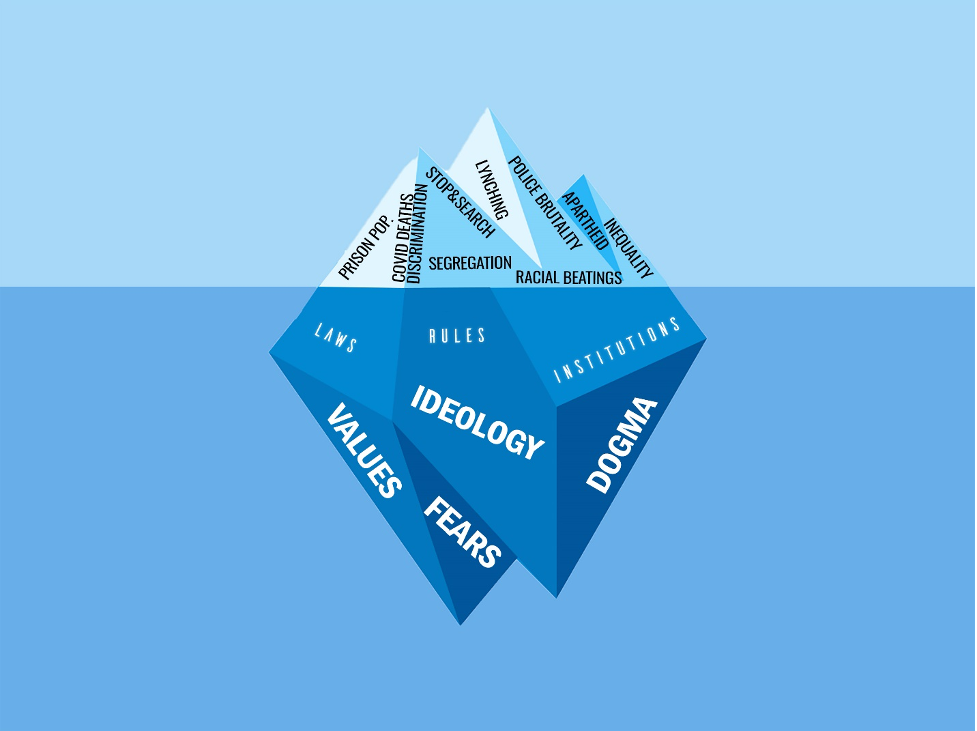
Copyright Dr. David Roberts 2020
I didn’t comprehend most of this, consciously, intellectually, but it had scored my malleable mind and character like a bradawl scores soft, unfinished wood. Higher Education led me to understand racism in Galtungian terms. That is, racism is formed from beliefs (racial superiority and hatred), takes life through rules (Apartheid, segregation, exclusion, discrimination) and manifests in physical (police shootings), emotional (fear of random but structured attacks), social (Ku Klux Klan, White Lives Matter) and psychological (self-loathing, self-esteem) manner. I learned from reading books and journals, and listening to video and audio accounts from survivors of Empire. I learned from watching Apartheid in the US and South Africa in film and documentaries. I learned from thinking and talking and thinking in conversation with activists and human rights workers and people’s everyday lives from Asia and the Middle East. I learned from prison notes written by General Vo Nguyen Giap during his incarceration at French imperial hands that ‘unwinnable’ wars, like against both France and the US – are won by creating extra-elite institutions and practices. I am still listening to all these voices, because racism disguises, morphs and renews itself, especially as it is exposed and challenged, as it is being right now. I study the critical race theory that has been banned by the British Tory government from British schools’ attempt to end racism. My understanding of racism in all its nuance and cruelty won’t end until racism ends and I have to keep working at it. Simple ‘training’ events make little or no difference because training is what the army does to enforce and reinforce simple routines. There is no interrogation of underlying values, beliefs and institutions in training. It just creates an impression of anti-racist endeavour, ticks boxes, maintains the structures. There is little of what the Brazilian pedagogue Paulo Freire called ‘conscientization’: becoming conscious of and comprehending the structures of power that create the abuse under investigation. Unless it comes from people of colour.
It should by now, five decades after I darkened the north of England solely by my physical presence, be unimaginable that the UK government should perpetuate racism in 2020. The UK has legislated against racism – normally first denying legislation is necessary, of course. Anti-racism is nothing if not an uphill battle against State denial. Yet the British government seems utterly unable to learn from the past and is thus doomed to repeat it. It has this month, in an act of bureaucratic oppression that would have made Stalin blush, amidst Black History ‘Moment’, criminalized the teaching of narratives of imperial white oppression in schools. ‘We do not want teachers to teach their white pupils about white privilege and inherited racial guilt’, Kemi Badenoch declared. What a contrast with how Germany dealt with its racial history after the Second World War. Whites could breathe a sigh of relief, because the pro-racist policy couldn’t be racist because it was announced and defended by a British parliamentarian of colour – and a woman at that – so it must be OK. For all the farcical nature of this latest form of racial censorship, she might as well have said she wanted Britain to carry on up the Khyber. But this is how institutions are racist, here and now, in the England that claims not to be institutionally racist, and where university Vice-Chancellors declare their own institutions to be racism-free zones, or fail to engage seriously with attempts at reform. They receive clear messages from the ideological centre: we will not tolerate resistance to white dominance.
I palled in that moment. I sank. I snapped a little more. And I remembered. I remembered what it was like when nobody in the UK had to come to terms with racism, when nobody had to acknowledge that the state of race relations in the UK remained based on the racial dominance facilitated by that ghastly word, ‘tolerance’. Those who can choose to tolerate are those that are authorized by their own identity and the State that accords that identity to grant permissions, and hold sway over your life. We may remain in thrall and anger to that dominance. If you step out of line – if you are an ‘Uppity Nigger’ – the weight of the state and society comes crashing down on you in ways it does not for white people. I should not be surprised. We are for now ruled by a Tory government. Conservatism stands commonly for the preservation of past elite power and values, and adherence to myths of history that it sells successfully to a population dumbed down by state school curricula controlled to produce primarily worker drones to serve the economy that keeps elites in power. Critical thought and challenge is in the process of being eradicated by the same parliamentarians who wish to eradicate their own racist past and present.
Conservatism continues publicly and rhetorically to persuade an insecure population confronted with socio-racial change that their citizens adhere to some generalizable ‘values’ that mirror a mythical England coloured brilliant white, populated by Knights and Saints slaying dragons and Moors. Its boorish public school leadership inevitably, consciously, imports the violent institutional racism of Trump’s culture wars, designed to shut down discussion of structural inequality and the institutions that shape and perpetuate racism. A racist constellation of forces has convened and conspired to resist challenges to white supremacy, the rules they dictate and the institutions that enforce them. There is a sickening sense of the past in the present once more, an indirect, murmured echo of the Rivers of Blood ‘ethos’ that reinforces the artificial, socially-construed and -constructed divide between black and white people that is the stuff of neo-imperial fantasy. Racial ideology in the UK remains anchored to an imperial past denied in the present that perpetuates the tens of thousands of ‘one-off’ racist events dismissed as anything other than what they are – a racial pandemic. Do you really think there was that much resistance to the colour Black entering the Monarchy’s bloodline if there wasn’t something much, much deeper going on? The House of Windsor has already been ‘diluted’ by its Mediterranean-Germanic heritage, an extant racial hotch-potch of inbreeding that locked up and hid Royal cousins Katherine and Nerissa Bowes-Lyon, two tragic biological consequences of its elitist and overly-narrow gene-pool. It cannot possibly be further ‘polluted’ by a woman of colour. Imperial British society roared its resistance, and so did its representative media.
Last words
The British government’s frankly predictable statement rejecting the teaching of challenges to white sensibilities, expressed with no sense of the surreal amidst public celebration of Black History Month/Moment, sends a message. It says that the key institutions of State are disingenuously racist – now, as they were when I was a kid. Black children will be exposed to new and old racisms that carry a new legitimacy afforded by the State’s refusal to recognize the range of beliefs that underpin and reify racism in white power elites like the UK and US. When I was a kid, the State, in Foucauldian fashion, projected its ‘tolerance’ of black into schools, hospitals and other recipients of white power and cultural legitimacy. The State is doing it again. History is repeating itself, in slightly different form, with a little more nuance and a lot more disingenuity. The State has taken action to suppress historical truth because it challenges the preferred sense of self Britain has evolved of itself and this will not do. This institutionally racist process, here and alive in 2020, will send a message that white is right and will not tolerate objection – there’s the ‘T’-word again. The racist messages of the past are projected once more, in myriad old and new forms. The presence of imperial statues and the arguments by almost exclusively white people that they should be preserved because ‘that’s part of Britain’s history’ without interrogating what that means, or what it might feel like to people of colour. The beliefs held by people who still think Empire was a ‘Good Thing’ that helped the savages evolve from their primitive cave lives. People unable to get beyond their White Fragility. Laws concerning US schooling that forbid the teaching of the genocide conducted against Native Americans. Policies that make black people more vulnerable than their white brothers and sisters to Covid-19. Actions that enslave people of colour to a lower order by marginalizing their education and their voting rights. Racism persists now, institutionally, nationally, as it did back then, when I came to know it as a youngster. It couldn’t be that extensive if it weren’t organized by institutions acting on ideology. Yet White America (sorry, Eminem) and White England, and white Vice Chancellors say institutional racism doesn’t exist. Denial doesn’t just foreclose truth. Truth is the recoil of denial but consequence is the bullet that flies. Denial sanctions more racism. Denial ain’ jus’ a river in Egypt.
The move towards ending racism in Universities is a Good Thing. But I am attuned to its structural, white determinism, as are many people of colour in HE. The initiative came from hegemonically-white structures of governance, through Advance HE and the Race Equality Charter, that serve institutionally-white agendas.[1] In Foucauldian fashion, government directed the production of more white structures of governance for Universities, perpetuating white priorities and beliefs about racism, including for some the deadly belief that racism is not structural but sporadic, and therefore explicable in ways that don’t confront and challenge white power structures and racist ideologies and bodies. This is racist in itself. And the process of various Midlands HE bodies acquiring REC accreditation, without which their public credentials, reputation and recruitment may be shamed and harmed, is often directed by a group of white men and women who dictate the anti-racist processes the institution should adopt, and then formed the groups of people of colour that would help them implement their ‘vision’, after they had decided what that vision would entail. This is ‘whiteness as moral authority entrusted to correct the unequal representation of ‘minorities’. This isn’t inclusivity. This is judicious maneuvering: naive or ignorant at best, manipulative or Machiavellian at worst.
The present agenda of anti-racism in HE has been both tolerated and refuted by a primarily white State that has just now criminalized, like a childish Trumpian tinpot dictator, the teaching of the truth of Empire and racism, lest White Fragility and the status quo be upset. ‘Whiteness’, said three scholar-activists, ‘may ambush anti-racist intentions and interventions’. There is little doubt that the present HE anti-racist agenda has been mobilized by the almost exclusively white quasi-governmental leadership of AdvanceHE. And white-dominated University leadership agendas are focused on how to get RECognition on the co-opted backs of people of colour so the (White) institution benefits. Yet those institutions are too often not concerned with what it takes to end racism, the stated objective of the REC Charter. There is an embarrassing absence of self-consciousness in this process; white leadership blunders around with little sense of how they have become part of the problem, not the solution. HEI leaders seem largely to be trying to direct not how racism in the workplaces they are responsible for shall be ended, but how they shall get REC accreditation with the minimum fuss, and minimum disruption to racist structures.
I have spent nearly 50 years enduring, fighting, surviving racism. It is a draining experience, the more so now that it is being reviewed and revived by society and state, because both fight to preserve it unconsciously and consciously, passively and belligerently. Those in power and those with fragility remain without conscientization and I am tired, after half a century, of trying to get white people to recognize that racism is part of their identity, their heritage, their institution and, behind all of that, their internalized beliefs. I am worn down by seeing effort after effort get rolled back one way or another. This fight is for another generation. I wish them better luck than I have had.
[1] Dar, S., Rodriguez, J. K. (2019) ‘White Governance and Whitely Governmentalities: Organizing White Power in UK Universities’, paper presented at the European Group for Organization Studies Conference, Edinburgh, 4 July.
Equity, Diversity and Inclusion
Reflections, comments, discussion and opinion on EDI topics from Loughborough University staff and students